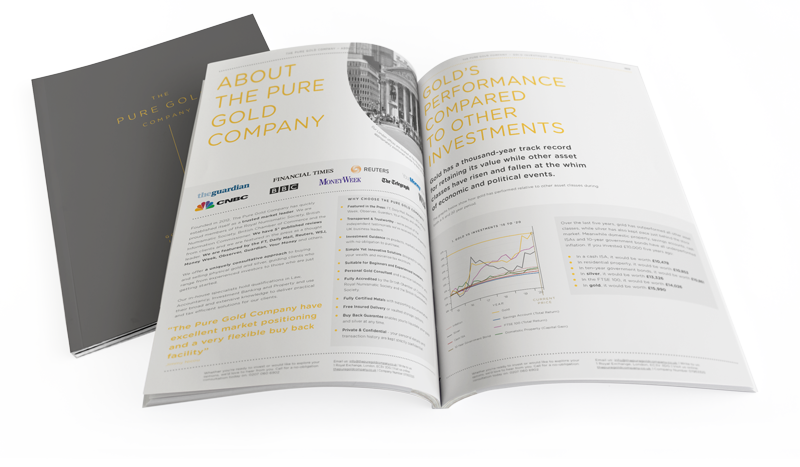Market volatility will always impact on pension savings, but the scale and extent of the current global economic crisis has many soon to be retirees worried. Investing in stable assets like gold as retirement nears is a necessity especially in these uncertain times.
The average pension plan fund value fell by 15% in the first quarter of 2020 according to the Moneyfacts UK Personal Pension Trends Treasury Report. Some savers are experiencing even more drastic declines depending on their pension sector focus. This is the worst quarterly performance on record.
Will Pensions Bounce Back?
Pensions have been dramatically impacted by the economic turmoil caused by the Covid-19 pandemic. In particular a slump in stock and bond Investment markets, which form a large proportion of many pension portfolios, has dragged the value down substantially. Understandably, many people nearing retirement age are concerned about the impact this might have on their pension pot and retirement incomes.
Some people may include property in their pension portfolio or rely on property income to top up their retirement, and this market has also been adversely affected. Some younger people will find their pension recovers over time. However, the immediate and expected medium-term effects of the economic shutdown will have a substantial impact on pensions destined to be drawn down in the next five years.
Recovery time
The nature of market investments, stocks and shares, is that they are subject to rises and falls, but over the long term deliver a rising return. However, the scale of the recent market shock has never been seen before. While the initial slump has levelled off, stock markets are still 20% below their pre-pandemic levels, and the future remains vastly uncertain.
The outlook for many companies, some of which will form part of pension portfolios, is not secure, and business failures are expected to rise as government schemes come to an end. The Office for National Statistics business indicators published in mid-May showed that 44% of companies responding to their survey had fewer than six months of cash reserves.
Bankruptcies will have a further impact on the markets in which many pensions are invested. The initial slump and muted recovery is likely to be just the start of a volatile period. Brexit, which is largely being ignored right now, will add to pressure on markets in the UK in particular. This is especially true if the country fails to conclude a satisfactory trade deal with Europe, its largest trading partner.
Investment Decisions
A 25-year old could cut their losses and buy into the market while it’s down, with time on their side to grow their investments from the ground up. When a recovery finally gets underway, it may be too late for people planning on retiring soon to recover the investments that have recently taken such a battering.
If markets decline even further, they may find their position in an even worse position when retirement day comes. Those closer to retirement will find the Covid-19 chaos has a substantial impact on when they can retire and how comfortable that retirement will be. Inevitably, those in this position are asking, “What can I do to minimise the impact of this storm on my retirement income?”
Derisking – the gold standard
As investors approach retirement age, it is prudent to swing the balance of assets in a pension portfolio towards the less risky end of the scale. Investments like government bonds, cash and gold are seen as offering a safe haven in troubled times. Gold has historically maintained its value throughout periods of economic and political uncertainty. If managed in the right way it can also be a very tax-efficient investment.
Gold’s relationship with other investments like stocks and property tends to be an inverse one, where a slide in the former prompts a surge in the latter. The correlation isn’t always absolute, because many things affect the price of gold and the volatility of the stock market. However, the majority of market declines have seen a flight to safe-haven assets like gold which have maintained or increased in value.
This relative stability against other assets is the reason gold bullion, gold bars and coins are often used as a hedge to balance out an asset portfolio. This becomes more important the closer you get to retirement. In addition, gold removes exposure to the banking system and limits counterparty risk.
Gold investment history
The gold price over the past twenty years bears out the wisdom of this precious metal as a safe-haven asset. In 2002 sterling-denominated gold was worth under £200 an ounce. Since then the value of gold has risen, with some peaks and troughs over the years to an all-time high of over £1400 today. The peaks largely coincide with period of uncertainty within the markets or shifts in global geopolitics, which correlate with gold’s safe-haven status.
Physical Gold And Pensions
Discover the benefits of investing in physical gold through your SIPP with our handy guide.

Even as gold has risen in price during the economic chaos caused by the Covid-19 pandemic, many commentators see further upside potential to the gold price over the medium term. In April, Investment bank Bank of America raised its forecast for gold over the next 18 months to $3,000, more than 50% above the price at the time. The same sentiment has been echoed by other large banks, including Goldman Sachs, where the precious metal remains a very popular investment choice with fund managers and investors.
How to Invest in gold in your pension
In 2006, the UK government allowed physical gold to be held in Self Invested Personal Pensions (SIPPs). The gold must be in the form of bars and a minimum purity of 995 out of 1000 (99.5% pure). The tax advantages of holding gold in your SIPP are that the government will provide tax relief between 20% and 45% depending on your tax rate.
The increase in the value of your gold over time is also accumulated free of capital gains tax, which is normally paid at 28%. Not all SIPPs are enabled to hold gold so it’s worth checking which ones do ahead of any decision.
Another advantage of physical gold is that it is required to be held in a vault and sits outside the banking system, fully insured, regardless of how much is purchased. The current deposit protection scheme only covers assets up to £85,000 if a bank was to fail.
Finding a SIPP that allows gold investment
Only some SIPPs enable you to invest in gold within them, so this is the first step in the process of adding the yellow metal to your portfolio. Your own SIPP may allow or even consider permitting physical gold as an investment – you will have to contact them to find out. There are a large number of SIPP providers to discuss your requirements with, some of which also require you to have sought advice from a financial advisor. That being said – some (if they are satisfied that you are competent enough and haven’t taken advice from anyone) will allow you to proceed on a “non-advised” basis also known as “execution only”. We suggest – that if you think you need advice you should take advice… Please note – that some SIPP providers may only work with certain UK gold brokers. It’s worth ensuring that you are happy with the mix of gold broker and SIPP provider. Some would say that if you can feel comfortable about the ongoing cost of the SIPP that more emphasis should be placed on finding the right UK gold dealer.
Finding a reputable gold dealer
Gold dealers cannot offer specific financial advice but a reputable dealer will be able to furnish you with procedural guidance. They can also help with facts about gold, its performance, what gold products are available and the timings of your gold purchase. Consider reputation, accessibility and security, do some research and ensure they can provide you with the right level of information you need. Are they able to explain the types of gold available so you can make an informed choice about what to invest in? Will they store on a segregated and allocated basis instead of pooled storage? Most importantly – will they offer a Buy Back Guarantee? It’s important that you are able to liquidate your gold quickly by having a guarantee from your provider to buy back any physical gold purchased from them.
Transfer funds from existing pension to SIPP
Gold purchased within a SIPP is held in a London Bullion Market Association approved vault, where it is segregated and allocated and fully insured by Lloyds of London. Once your new SIPP is set up, your current provider will send funds to your new SIPP provider. At this point, you fill in a form (an instruction to purchase) that permits the SIPP provider to purchase a certain amount of physical gold bars. Funds are transferred to your gold brokerage and you will run through with your broker the various sizes and denominations of available gold bars. It’s important to ensure that you don’t focus purely on cheap bars or large bars as whatever you think you are saving on your purchase might end up costing you when you are ready to sell. A good gold broker should be able to run through the ins and outs of different types and sizes of gold bars upon the allocation stage. It’s critical that any bars that are purchased are from LBMA providers. Once the allocation is complete – you are sent your paperwork (Transaction Invoice, Storage Agreement, Certificate of Authenticity) secure in the knowledge that you can sell at any point. The professionals currently view their SIPP gold investments as an opportunity to take advantage of something that tends to increase in times of uncertainty with a plan to sell when gold is high and then transfer some of these gains into devalued stocks at a much cheaper price than we can find at current values.


